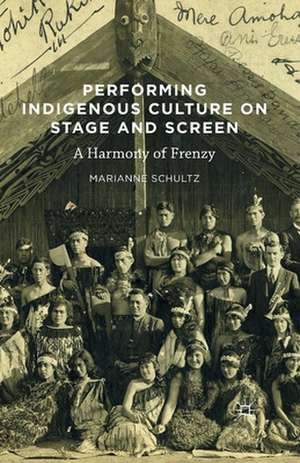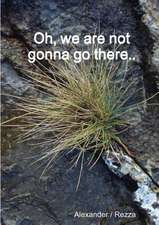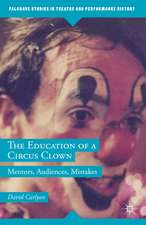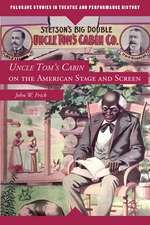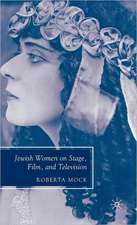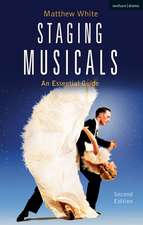Performing Indigenous Culture on Stage and Screen: A Harmony of Frenzy
Autor Marianne Schultzen Limba Engleză Paperback – 14 apr 2016
| Toate formatele și edițiile | Preț | Express |
|---|---|---|
| Paperback (1) | 449.74 lei 6-8 săpt. | |
| Palgrave Macmillan US – 14 apr 2016 | 449.74 lei 6-8 săpt. | |
| Hardback (1) | 585.08 lei 6-8 săpt. | |
| Palgrave Macmillan US – 4 feb 2016 | 585.08 lei 6-8 săpt. |
Preț: 449.74 lei
Nou
Puncte Express: 675
Preț estimativ în valută:
86.07€ • 89.53$ • 71.05£
86.07€ • 89.53$ • 71.05£
Carte tipărită la comandă
Livrare economică 14-28 aprilie
Preluare comenzi: 021 569.72.76
Specificații
ISBN-13: 9781349720965
ISBN-10: 1349720968
Pagini: 242
Ilustrații: XIII, 242 p.
Dimensiuni: 140 x 216 mm
Greutate: 0.3 kg
Ediția:1st ed. 2016
Editura: Palgrave Macmillan US
Colecția Palgrave Macmillan
Locul publicării:New York, United States
ISBN-10: 1349720968
Pagini: 242
Ilustrații: XIII, 242 p.
Dimensiuni: 140 x 216 mm
Greutate: 0.3 kg
Ediția:1st ed. 2016
Editura: Palgrave Macmillan US
Colecția Palgrave Macmillan
Locul publicării:New York, United States
Cuprins
Chapter 1 Prologue/Introduction
Chapter 2 M?ori, New Zealand and Empire on stage
Chapter 3 Alfred Hill and Princess Iwa: M?ori Music and Musical Hybridity
Chapter 4 Performing landscape, people and stories: Rotorua and the Reverend Frederick Augustus Bennett
Chapter 5 A 'Harmony of Frenzy': M?ori in Manhattan 1909-1910
Chapter 6 'Maori-land' on film
Chapter 7 Encore/Conclusion
Chapter 2 M?ori, New Zealand and Empire on stage
Chapter 3 Alfred Hill and Princess Iwa: M?ori Music and Musical Hybridity
Chapter 4 Performing landscape, people and stories: Rotorua and the Reverend Frederick Augustus Bennett
Chapter 5 A 'Harmony of Frenzy': M?ori in Manhattan 1909-1910
Chapter 6 'Maori-land' on film
Chapter 7 Encore/Conclusion
Recenzii
“In Performing Indigenous Culture on Stage and Screen: A Harmony of Frenzy, Marianne Schultz argues that performance is central to understanding the history of New Zealand … the book pushes the conversation about cultural performance forward and succeeds in making her point that understanding New Zealand’s history requires an examination of Māori and Pākehā performance. Her approach will be particularly helpful to scholars interested in researching how embodied cultural practices shaped conceptions of race and nation … .” (Joanna Das, H-ANZAU, H-Net Reviews, May, 2018)
“Schultz’s analysis is as comprehensive as it is impressive. Readers will appreciate the meticulous care taken in the footnotes (many of which will prompt readers to take Schultz’s ideas further). Moreover, by bringing readers to more contemporary performing arts … Schultz reminds us that the questions that lay at the heart of her text remain open and subject to our continued interrogation. … Schultz’s book is a valuable contribution that nudges historical and post-colonial debate in New Zealand … .” (Geoffery Z. Kohe, Dance Research Journal, Vol. 36 (01), 2018)
Notă biografică
Marianne Schultz is Honorary Research Fellow in History at the University of Auckland, New Zealand, and is the Auckland Advisor for DANZ- Dance Aotearoa New Zealand. Marianne danced professionally in the United States and New Zealand and has taught for numerous companies and schools. Her articles and chapters on dance and the performing arts have appeared in Theatre Journal, Dance Research, Melbourne Historical Journal, New Zealand Journal of History, Brolga, Te Ara/ the Encyclopedia of NZ, Moving Oceans: Celebrating Dance in the South Pacific, and Staging the Other in Nineteenth-Century British Drama.
Textul de pe ultima copertă
Examining corporeal expressions of indigenousness from an historical perspective, this book highlights the development of cultural hybridity in New Zealand via the popular performing arts, contributing new understandings of racial, ethnic, and gender identities through performance. The author offers an insightful and welcome examination of New Zealand performing arts via case studies of drama, music, and dance, performed both domestically and internationally. As these examples show, notions of modern New Zealand were shaped and understood in the creation and reception of popular culture. Highlighting embodied indigenous cultures of the past provides a new interpretation of the development of New Zealand's cultural history and adds an unexplored dimension in understanding the relationships between M?ori (indigenous New Zealander) and P?keh? (non-M?ori) throughout the late nineteenth and into the early twentieth centuries.
